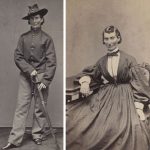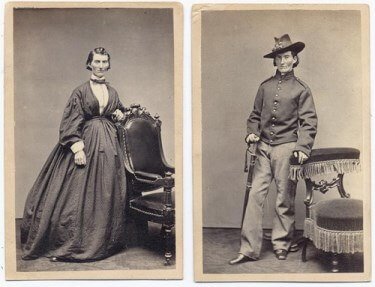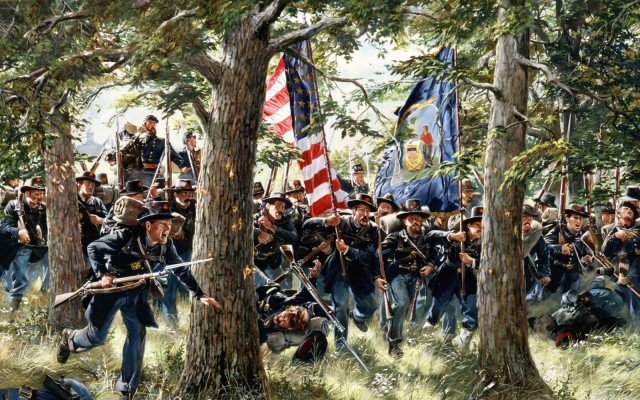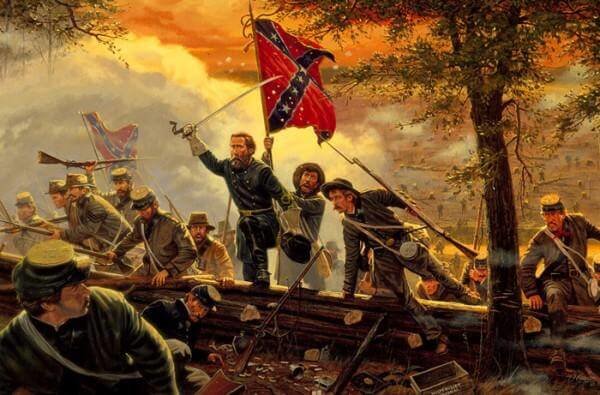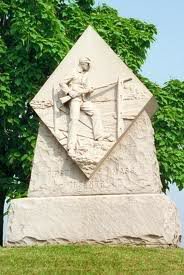Civilian Killed at the Battle of Gettysburg

Seamstress Jennie Wade (1843–July 3, 1863) was the only Gettysburg civilian killed directly during the Battle of Gettysburg. Jennie and her mother were visiting her sister, Georgia Anna Wade McClellan, at 528 Baltimore Street to assist her and her newborn child. On July 1, 1863, during the first day’s fighting, more than 150 bullets hit the McClellan house. But it was not until July 3 that tragedy struck.
Mary Virginia Wade was born in Gettysburg, Pennsylvania, in May 1843. When Jennie was a child, her father worked for a man named Johnston Hastings Skelly, who had a son of the same name. He was called Jack. Jack and Jennie were always friends, but they grew closer when they were teenagers.
Another childhood friend, Wesley Culp, was living in western Virginia when the Civil War began. His own family members still living in Gettysburg joined the Union Army. Jack Skelly enlisted in the 87th Pennsylvania Infantry in April 1861. Wesley decided to fight for the Confederacy.
In June 1863, General Robert E. Lee was in the Shenandoah Valley, preparing to invade the North. The Battle of Winchester was fought on June 15, 1863, during which Jack Skelly was injured. He was carried to a hospital in Winchester.
During this time, Jack and Wesley saw each other, and Jack gave Wesley a letter to take to Jennie if he ever got to Gettysburg again, never knowing that armies and fates would collide in their birthplace, and bring on one of the largest and bloodiest battles of the Civil War.
Of course, Wesley got there two weeks later, with the entire Army of Northern Virginia. He managed to sneak away and visit his sisters, and he told them that he had a message for someone that he must deliver in person, but he did not say who.
On July 3, 1863, the third day of the battle, Wesley was involved in the fighting to take Culp’s Hill from the Yankees. He was mortally wounded, on land that was part of his Uncle Henry’s farm. Wesley’s body was never identified. He was probably buried in a common grave with many others who fell that day.
Now, we come to Jennie. Her life had not been easy. Her father had some sort of breakdown and was in an asylum. Her mother had to support the family, and Jennie worked as well, doing whatever she could to bring in a little money. The war had seemed far away, and she had no inkling of what was to come. But when it came she did her part.
She had carried food and water to the Union soldiers during the first two days of battle, and her supply of bread was running low. On the morning of July 3, 1863, she and her mother went to her sister’s house on Baltimore Street to bake bread for the soldiers, and to care for her sister, who had given birth to a baby the week before.
Union soldiers on the picket line nearby told the women several times that it was dangerous to stay there, but they refused to leave. Whenever there was a lull in the shooting, Jennie carried bread and water to the soldiers.
Ignoring the stray bullets that were striking the house, Jennie was standing in the kitchen, mixing bread dough, when a bullet from a sharpshooter’s rifle traveled through two doors and entered her back. It pierced her heart. She fell dead, at the age of 20.
The soldiers heard the women scream and rushed in to find Jennie laying on the floor. They wrapped her lifeless body in a blanket and carried it to the cellar until after the battle was over. A picture of Jack Skelly was discovered in the pocket of her apron.
Jack died of the wounds he received in Virginia on July 12, just nine days later, never knowing of Jennie’s fate. They were buried close to each other in the Evergreen Cemetery at Gettysburg. The citizens of Gettysburg raised money and placed a marker on her grave.
A bronze statue of Jennie stands today on Baltimore Street, holding a loaf of bread and a water pitcher, just as she appeared on the day she died. She was the only civilian killed during the Battle of Gettysburg.
She was a true patriot.
